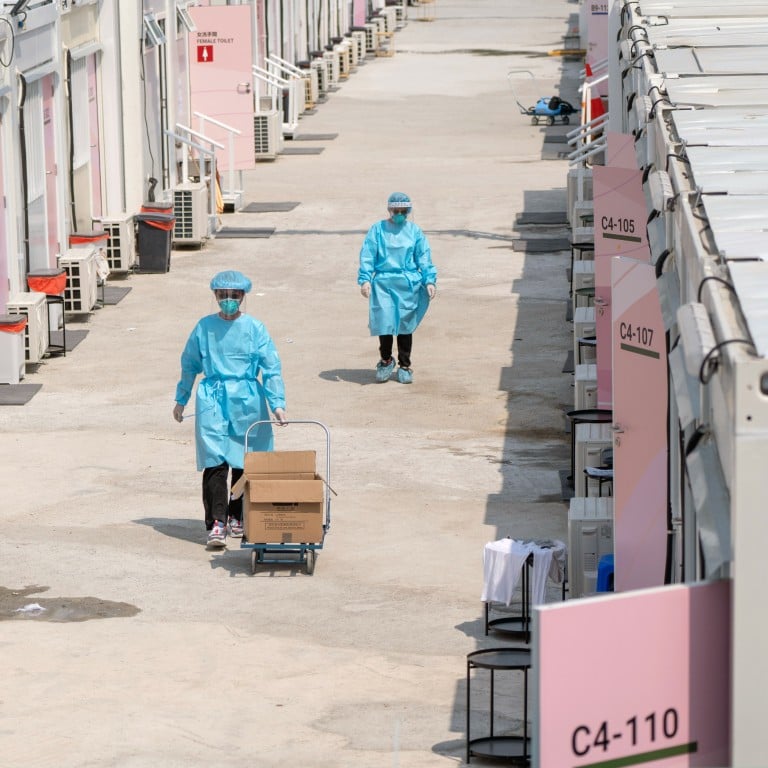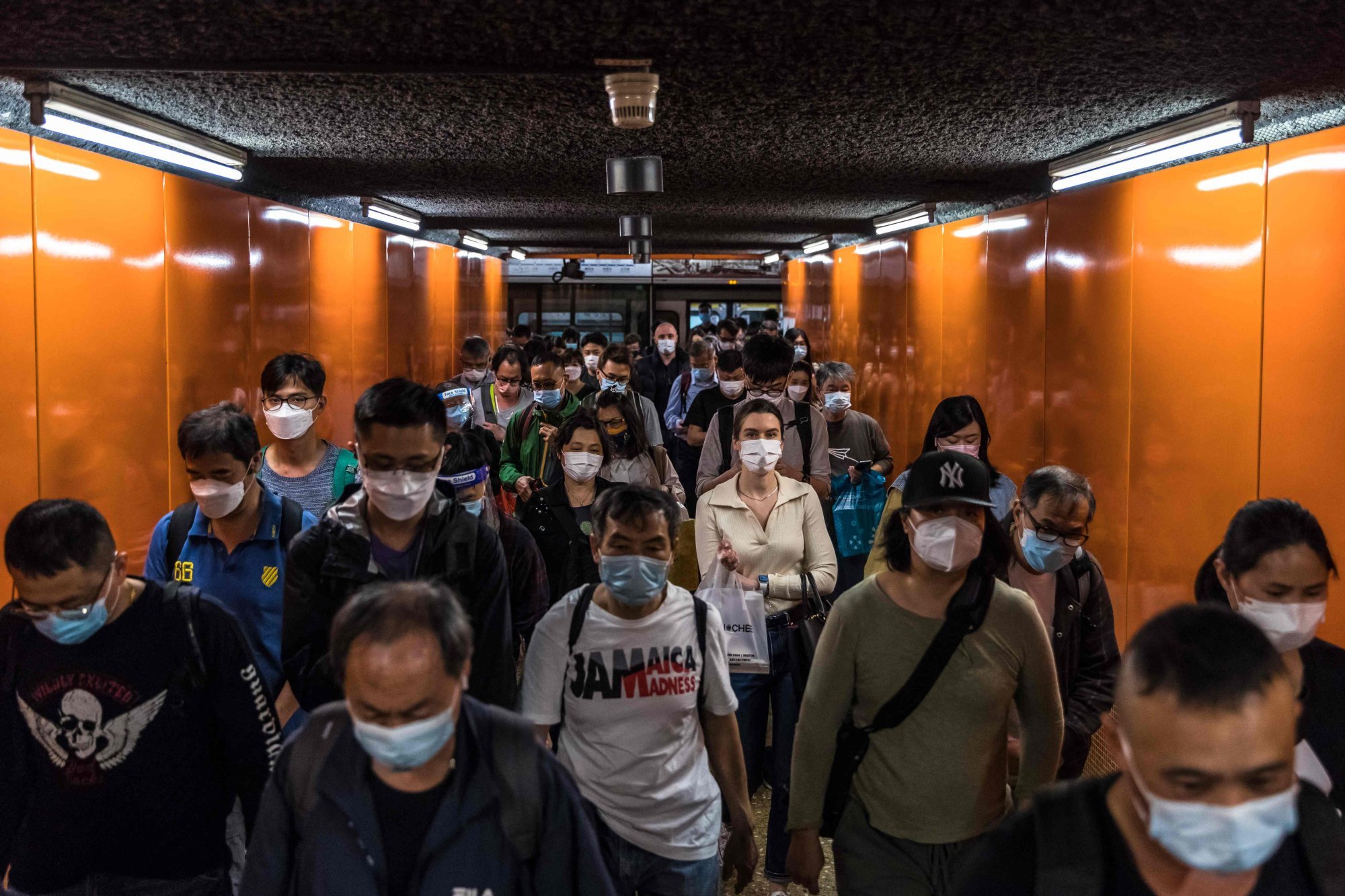
Hong Kong’s zero-Covid policy risks becoming a trap if no lessons are learned from this tragedy
- Authorities could have used last year to develop a road map for living with Covid-19 and prepare for an inevitable outbreak as new variants of the virus emerged
- They didn’t, and are unlikely to adopt a more anticipatory or sustainable approach any time soon – unless the mainland does so first
In the first year of the pandemic – before vaccines were widely available and when levels of natural immunity against Covid-19 were low or nonexistent – strict containment measures aimed at suppressing its spread were not only justified, they were the most prudent course of action.
Even if there was little chance of eliminating the virus, the arguments for its strict containment were valid: to protect the health care system from being overburdened, and to buy time for vaccines and/or better treatments to be developed.
In the first 15 months of the pandemic, the benefits to society of strict suppression, in terms of lives saved and severe illness avoided, outweighed the economic and social costs. The places that resorted to this policy – Australia, Hong Kong, New Zealand, Singapore, South Korea, and Taiwan – not only avoided large outbreaks, they also had far fewer excess deaths than those jurisdictions that were unable or unwilling to impose similar measures.

With the benefit of hindsight that comes after two years of Covid-19, there is little doubt about any of this. In fact, fewer people died in these zero-Covid jurisdictions throughout 2020 and much of 2021 than would have done if there was no pandemic – a phenomenon known as “negative excess deaths”.
From the middle of last year, however, the cost-benefit calculus for imposing such measures began to change – at least in developed countries that were well on their way to high levels of vaccination.
Hong Kong needs a Covid-19 command centre fast – or risk losing to Singapore
With highly vaccinated populations, the case for zero-Covid became much less compelling. First, the costs of measures such as lockdowns, mass testing, hospitalising all positive cases and quarantining close contacts increased considerably, as more transmissible variants made harsher, more prolonged enforcement necessary to achieve a given level of suppression.
Second, the benefits of pursuing zero-Covid diminished as vaccinations significantly reduced rates of severe illness and death. This meant that jurisdictions still pursuing suppression had to endure rising costs even as the strategy’s efficacy and marginal benefits decreased.
An avoidable crisis
Faced with the worsening cost-benefit calculus of maintaining zero-Covid, it was always incumbent on the Hong Kong government to plan, and prepare the population, for a transition to a world in which the virus would not be eliminated.
Many analysts in the second half of last year called on the authorities to develop a road map for living with Covid-19. I was among them, writing in August about the need for a “risk mitigation framework” that should include vaccination targets and timelines, an emphasis on ensuring sufficient hospital and ICU capacity instead of fixating on daily infection counts, and a plan for reopening to travel with shorter quarantine requirements – while retaining public health measures such as indoor mask wearing.
It is clear from the chaos and confusion of the past few weeks that the Hong Kong government did not heed this common-sense advice, leaving it without an alternative plan centred on mitigation and risk reduction when its zero-Covid policy failed to prevent a large outbreak.
The authorities could have, and should have, prepared for what was always a known risk
The high Covid-19 mortality rate Hong Kong is currently experiencing is not the result of some unforeseen disaster like an earthquake or volcanic eruption. The surge in cases, the overwhelmed public health care system, the thousands of deaths among Hong Kong’s under-vaccinated elderly population: all could have been, and were, predicted.
In August, I wrote that it was “an indictment of Hong Kong that the segments of the population that are the most vulnerable to severe disease and death from Covid-19 are also the least vaccinated”, calling higher vaccination levels among the elderly “an urgent priority”, and warning that when the city did face a large outbreak “it is almost inevitable that deaths and severe disease will be concentrated among the old and unvaccinated”.
In short, this was no black swan event. The authorities could have, and should have, prepared for what was always a known risk. That they did not – probably because of hubris and a misplaced confidence in their zero-Covid policy – is the main reason Hong Kong still cannot afford to live with the virus.
Getting Covid in Singapore: after 6 days in home isolation, I was free to leave
That isn’t to say that low vaccination levels among the vulnerable elderly are the sole reason for Hong Kong’s unusually high daily Covid-19 death tolls – contrary to a narrative that has been put out by government leaders. Other comparable cities around the world reported lower mortality rates even at the height of their worst outbreaks in early 2021, before vaccines were widely available.
Clearly there were other factors at play. An honest assessment of what went wrong must also take into account the possibility of an under-resourced public health care system that was inadequately prepared for a large outbreak.
What happens now?
It’s unlikely that Hong Kong will adopt a more anticipatory or sustainable approach to Covid-19 over the next few months, even as the Omicron wave recedes, unless the mainland does so first. For their part, mainland authorities have given little indication that they will modify their increasingly costly dynamic zero-Covid strategy – not least because Hong Kong’s experience has failed to inspire any confidence in the possibility of transitioning to living with the virus without an unacceptably high death toll.
At least three other factors work against the mainland changing its pandemic policy any time soon:
-
First, due to a lack of exposure, the general population has virtually no natural immunity against Covid-19. Apart from an initial outbreak centred on Wuhan and Hubei province, the mainland – much like Hong Kong, until recently – has not experienced any large waves of infection. Even though Omicron is less severe than previous variants or the original virus, its high transmissibility means that there might still be many hospitalisations and deaths, particularly among the elderly. Outside major cities, the mainland’s hospitals are also under-resourced and would struggle to cope with a large surge in infections of the sort that hit Hong Kong.
-
Second, the Chinese government has not prepared the population for the inevitability of living with Covid-19. State media have constantly denigrated such an approach as reckless, callous and Darwinian, as the authorities have portrayed their efforts against the virus as a war against an intolerable enemy. Crisis communications such as these are not only myopic, they also limit the ability of the government and society at large to adapt to a world in which living with the enemy is unavoidable.
-
Third, the early successes of zero-Covid have created biases that make it exceedingly difficult for the authorities to change course. What behavioural economists refer to as the sunk-cost bias predicts that even in the face of mounting costs, decision-makers will stick with a suboptimal strategy as abandoning it would make them feel like their previous efforts were in vain. The present bias, meanwhile, predicts that officials will heavily discount the long-term costs of maintaining zero-Covid to avoid the short-term pain of transitioning to living with the virus – leading to procrastination: repeatedly putting off unpleasant but necessary changes.
It is, of course, bad news for Hong Kong that mainland China is likely to remain in a zero-Covid trap, with its never-ending cycle of lockdowns and disruptions to the economy and everyday life each time there is an outbreak.
Xi’s zero-Covid message has implicit warning against HK drifting from the mainland
Only the most optimistic of analysts expect the authorities to have accepted the reality of living with Covid-19 by April, when the current Omicron wave is forecast to recede. It’s far more likely that Hong Kong will retreat inside its zero-Covid shell.
This would be a second tragedy for Hong Kong: a society still unable to live with the virus – despite paying such a high price – because its leaders did not anticipate, plan or prepare for it.
Donald Low is senior lecturer and professor of practice in public policy, and the director of the Institute for Emerging Market Studies, at the Hong Kong University of Science and Technology.

